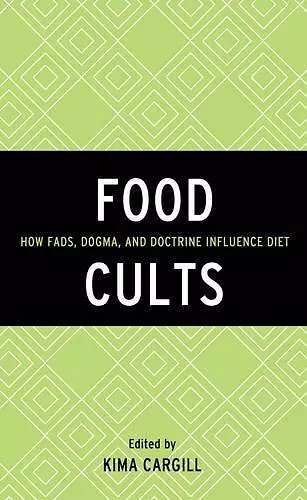Food Cults
How Fads, Dogma, and Doctrine Influence Diet
Format:Hardback
Publisher:Bloomsbury Publishing PLC
Published:1st Dec '16
Currently unavailable, and unfortunately no date known when it will be back

What do we mean when we call any group a cult? Definingthat term is a slippery proposition – the word cult is provocative and arguably pejorative. Does it necessarily refer to a religious group? A group with a charismatic leader? Or something darker and more sinister?
Because beliefs and practices surrounding food often inspire religious and political fervor, as well as function to unite people into insular groups, it is inevitable that "food cults" would emerge. Studying the extreme beliefs and practices of such food cults allows us to see the ways in which food serves as a nexus for religious beliefs, sexuality, death anxiety, preoccupation with the body, asceticism, and hedonism, to name a few. In contrast to religious and political cults, food cults have the added dimension of mediating cultural trends in nutrition and diet through their membership.
Should we then consider raw foodists, many of whom believe that cooked food is poison, a type of food cult? What about paleo diet adherents or those who follow a restricted calorie diet for longevity? Food Cults explores these questions by looking at domestic and international, contemporary and historic food communities characterized by extreme nutritional beliefs or viewed as "fringe" movements by mainstream culture. While there are a variety of accounts of such food communities across disciplines, this collection pulls together these works and explains why we gravitate toward such groups and the social and psychological functions they serve. This volume describes how contemporary and historic food communities come together and foment fanaticism, judgment, charisma, dogma, passion, longevity, condemnation and exaltation.
The authors of the 15 chapters in this fascinating exploration into the typical ‘why we eat what we eat’ conversation employ a historical perspective to explore dining experiences and the development of specific food practices in varying communities. Food fads and diets generate powerful followings of individuals, and these essays explore why and how food cults develop while also addressing food's appeal from health, social, and ritualistic standpoints. In her opening chapter, editor Cargill addresses the social and psychological pull that food cults provide for members of a community, as well as how food cults can contribute to religion, gender issues, and cultural trends. Communities hold different ideologies towards food, and this book explores the social dynamics surrounding the ways individuals embrace food and nourishment, and why their behaviors are justified.
Summing Up: Highly recommended. Upper-division undergraduates and above.
Researchers seeking a grounded counterpoint to online forums and social media would deeply benefit from this carefully chosen collection of essays. . . Folklorists interested in small-group dynamics, the evolution of religion, secular ritual, and identity politics would find this compilation fascinating. Omnivores, cookbook aficionados, culinary historians, and librarians interested in diversifying their food literature would benefit from this set of social criticism. Mental health practitioners working with extreme eaters or loved ones who are concerned about extreme eating behaviors could find this a helpful addition to their library. While not an overt critique of individual cults’ ideologies, Food Cults introduces a healthy dose of skepticism and critical review to the complicated conversation about healthy bodies and healthy communities. * Digest: A Journal of Foodways & Culture *
This book is for anyone who has ever been curious about why we are attracted to food fads and food dogma and how they shape our identities, food preferences, and nutritional beliefs, as well as our consumer economy. From superfoods and paleo to gluten-free, this fascinating multi-authored volume on dietary ideologies—anchored in theory—explores these topics via case studies on specific historical and contemporary food cults and communities. -- Jennifer Otten, Assistant Professor, University of Washington, Center for Public Health Nutrition
This skillfully edited volume examines a central question in food studies—why we eat what we eat—through the lens of food cults, communities that develop around food ideologies or beliefs. Editor Kima Cargill insightfully recognizes that the human needs for belonging, affirmation, and meaningfulness are intimately connected to the need for nourishment, and she brings together here interdisciplinary and international perspectives to shed light on the social dynamics of groups addressing those needs. -- Lucy M. Long, PhD, Director, Center for Food and Culture, Bowling Green, OH
Food and cults? What an enticing and somewhat sensational topic! Editor Kima Cargill has assembled a rich and compelling collection of essays exploring the complex and sometimes surprising connections between devoted spiritual and secular collectivities and foods of many classes and types. The volume is loaded with stimulating case studies and thought provoking theoretical analyses. A very worthy addition to institutional library and personal holdings alike. -- Stephen Wooten, PhD, Associate Professor of International Studies & Anthropology, Director of the Food Studies Program, University of Or
ISBN: 9781442251311
Dimensions: 239mm x 158mm x 26mm
Weight: 599g
278 pages